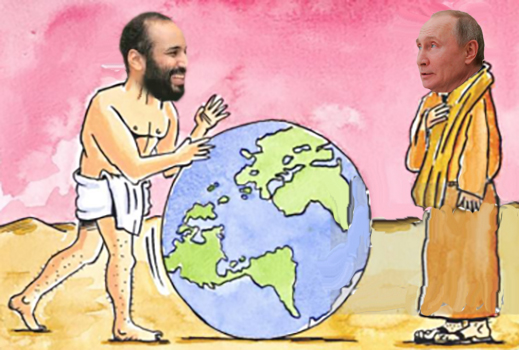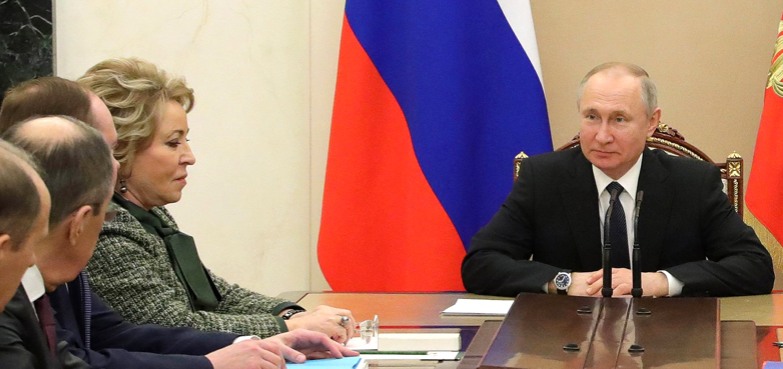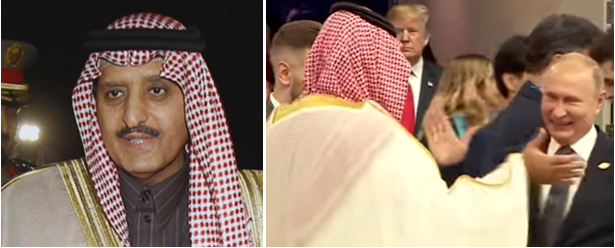

by John Helmer, Moscow
@bears_with
An attempt is underway to arrange a meeting between President Vladimir Putin and the Saudi Crown Prince Mohammed bin Salman (MbS) to restore the agreement on oil production cuts which MbS broke at the March 6 meeting of the Organisation of Petroleum Exporting Countries with Russia (OPEC+). The Crown Prince is reportedly now ready to agree on a formula for oil production limits along the lines already discussed with the Russians.
His pre-condition is a domestic Saudi one. He is insisting that he will meet President Putin as the Saudi head of state, no longer as Crown Prince. This means that the full and formal transfer of power from his father King Salman bin Abdullaziz will take place “imminently”.
According to Russian sources, the two men were planning to meet next at the Riyadh summit conference of the G20 states. But this isn’t scheduled until June 28.
In the meantime, the Saudi government, which currently serves as president of the G20 group, has issued a call for an emergency meeting of G20 heads to convene within days by video conference. The Saudi call on March 18 described the meeting’s purpose to “advance a coordinated response to the COVID-19 pandemic and its human and economic implications.”
The Kremlin understands the plan for the Saudi King’s abdication and Crown Prince’s succession was interrupted when MbS, 34, was expected it to be announced, before the OPEC+ meeting began in Vienna on March 5. The blocking move came from other members of the Saudi royal family loosely grouped around MbS’s uncle, King Salman’s brother, Prince Ahmed bin Abdulaziz,77; he controlled the Saudi Interior Ministry until 2012, when he was succeeded by Prince Mohammed bin Nayef, 60. US officials tell their newspapers that Mohammed has been a “longtime American favorite. He had developed close ties to American intelligence agencies during years of work together while he was interior minister. He was ousted from both of those roles by the current crown prince in 2017 and he has effectively been under house arrest since then.”

Left: Prince Mohammed with US Secretary of State Hillary Clinton in 2013. Right: Mohammed with President Trump’s son-in-law and daughter, Jared Kushner and Ivanka Trump, in May 2017.
Ahmed; Mohammed; Mohammed’s half-brother, Prince Nawaf bin Nayef; and Prince Ahmed’s son, Nayef Bin Ahmed, head of the Land Forces Intelligence and Security Commission, were arrested at their homes early on Friday morning, March 6; that was several hours before the OPEC+ session began in Vienna. Some sources claim there were up to twenty royal family arrests.
The announced charge was treason; the real reason was a combination of lèse-majesté and plotting over the succession. “ ‘King Salman has summoned Ahmed to the palace every year to convince him to accept his son’s ascent to the throne,’’ Al-Jazeera has quoted a Saudi source. The medium represents its proprietor, the Qatari government, which is hostile to Riyadh. According to the source, “ ‘Ahmed refused to give bay’a [pledge of allegiance] to MBS, saying the throne was his rightful place, based on their father’s will…Prince Mohammed feels that if he does not take the throne during Trump’s reign, he will never get the chance.’’ US media reports parrot this interpretation. The involvement of the US and British secret services in the plotting and media disinformation is not in doubt among the Saudis.
The Russian assessment, confirmed in the Kingdom, is that for the time being there is “no possible ouster [of MbS]. He is very well protected.” Also, there appears to be no doubt about that in MbS’s circle. This sense of his security has inhibited MbS’s unbridled temper — already well-known — from bridling as long as it has in the present circumstances.
Saudi sources now reveal that MbS held a meeting with his uncle, Prince Ahmed, on or about March 19. This has not been officially announced in Riyadh nor leaked to the press. If they have composed their differences, and if Ahmed has given an allegiance undertaking MbS is willing to accept, then the succession formalities can be implemented.
“It is very imminent for the chairs to be moved,” a source reports from the Crown Prince’s circle. “Waiting now for the official ceremony which requires a show of public approval to display support”. Once this is done, MbS will meet Putin, the source believes.
The possibility was discussed by President Putin with the Security Council at their meeting on Friday (March 20). The codeword for resumption of Russian-Saudi negotiations over oil supplies to the market is in this sentence of the communiqué of the discussion — “economic stabilisation measures in conditions of high volatility and crisis manifestations on international markets.”

President Putin, looking not quite himself, at the Security Council meeting on March 20. To his right (left to right): Alexander Bortnikov (FSB), Sergei Lavrov (Foreign Ministry), Dmitry Medvedev (Council Deputy Secretary), and Valentina Matvienko (Speaker of the Federation Council). Source: http://en.kremlin.ru/resident/news/63041#
For analysis of the Kremlin’s preparations for the March 5-6 OPEC+ meetings, read this. Had MbS not moved to block it, the Russian proposal would have been adopted by OPEC+. Before the March 6 session opened, that meant extending the status quo – production limits and country quotas — agreed last December, for at least another quarter, possibly two, to allow time for the recovery of the Chinese economy and the revival of oil demand.
The Saudi sources are confident in predicting that MbS will change his mind if Prince Ahmed is compelled to. They and the Russian sources, as well as US investment bankers, concede this will also oblige a show from Washington that the Trump Administration will put its interest in lifting the oil price ahead of the CIA and Pentagon schemes for regime change in Riyadh, not to mention Moscow. Neither MbS nor Putin has reason to believe Trump.

Left: Prince Ahmed, returning to Riyadh from political haven in London, November 2018. Right: Prince Salman and President Putin use an American form of handshake for greeting at the G20 summit meeting in November 2018. President Trump is in the background.
The global political benefit to them both is obvious if by meeting and making a show of agreement on a new OPEC+ deal, they can satisfy their own domestic needs. For Putin this also means addressing the requirements of the Russian oil producers. Among them LUKoil has publicly advocated accepting a fresh cut in quotas for the OPEC members and for Russia. Vagit Alekperov, who controls LUKoil, said on March 11: “I hope that after the technical committee OPEC+ panel in March, the countries will be able to find a mutually beneficial decision, which would allow the stabilisation of prices and the market.” That committee meeting, scheduled for March 18, was put off because MbS refused to send his representative.
Leonid Fedun, co-shareholder and LUKoil vice president, said late last week: “It is necessary to reach agreements again, though for doing that it is necessary to overcome the pessimism of those who thwarted the deal.” Pessimism wasn’t the deal-breaker in Vienna, Fedun knew; he was criticizing Igor Sechin of Rosneft.
LUKoil is not as influential in the Kremlin as the state oil companies, led by Sechin and Vladimir Bogdanov of Surgutneftegas. They have publicly declared their reluctance to accept a new round of cuts by OPEC if the outcome is that US share oil producers gain market share at their expense. But if OPEC can reach an accommodation on supply restrictions with them, Rosneft is likely to support the terms Putin will take to his meeting with MbS.
Industry reports of telephone talks late last week between the OPEC Secretary-General Mohammed Barkindo and the Texas Railroad Commission, which regulates the shale oil producers, opened the possibility of a US supply cut coordinated with Russia and Saudi Arabia. At the moment, though for different reasons, Putin and MbS share distrust of the Americans.
Tass reported Dmitry Peskov, the Kremlin spokesman, saying on Friday: “We never disclose instructions Putin gives to Novak and will not do it this time.” Alexander Novak is Russia’s Minister of Energy and negotiator at the OPEC+ ministerial meetings.
Asked if, in the preparations now under way for the emergency G20 summit conference this week, Putin and MbS will discuss terms for a new OPEC+ agreement, Peskov said: “this will depend on what issues the participants in the meeting will raise and how… This is communication between the leaders, they are free to raise those issues, which they deem necessary.”
As for direct talks with MbS, Peskov told Tass, “not yet”. That was last week.











Leave a Reply